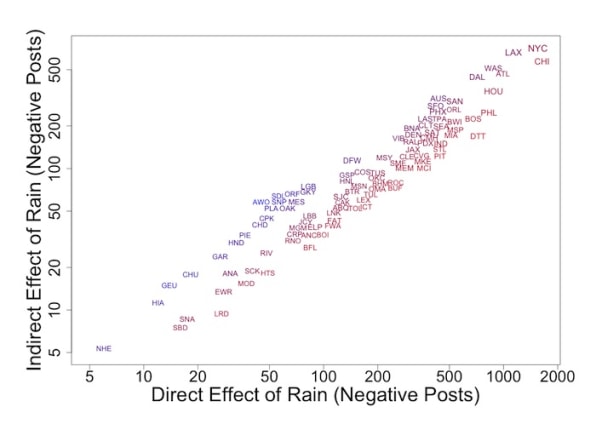Status For Facebook To Get Likes
For about 1.23 billion people on this planet, Facebook is there, in sickness and in health, in good times and in bad, in joy as well as in sorrow. But venting to Facebook creates a significant emotional ripple effect: In the social network, keeping your feelings to yourself is not an option, and curiously, positive vibes are more contagious than negative ones, according to a new study.
To measure how the emotional content of a person's Facebook status updates might affect other users, the group of researchers (including two Facebook employees)–who published today in PLoS One–collected anonymized status updates from the 100 most populated cities in the U.S. between 2009 and early 2012. They then ran them through a software program called the Linguistic Inquiry and Word Count, a generally reliable auditor of basic feelings.

Rainy days, somewhat unsurprisingly, created an outsized emotional effect: Rain increased the number of negative posts by 1.16%, and decreased the number of positive posts by 1.19%. That observation set the stage for a natural experiment: How far would emotions motivated by rain spread through the social network? If New York City's rain-induced pathos could affect users in New Mexico, it would say something remarkable about the power of online emotional contagion.
And that's precisely what the researchers found. "If it rains in New York, people around the country become miserable," says study co-author Nicholas Christakis, professor of sociology and medicine at Yale University. This works in every direction, though given New York's population, it has an outsized influence. But weirdly enough, it wasn't the negative posts that carried the most viral ability: Each positive post yielded an additional 1.75 positive posts, whereas negative posts only spread an additional 1.29.
So what does this mean? The study authors write that the nature of the spread could create "clusters of happy and unhappy individuals" with greater positive or negative agency. "As a result, we may see greater spikes in global emotion that could generate increased volatility in everything from political systems to financial markets," they write.
At the same time, co-author James Fowler, University of California-San Diego social scientist, argues that this contagious quality could actually play a major role in creating something he calls an "epidemic of well-being."
"I think overall this is good news because it suggests that we have a mechanism now that we didn't have 10 years ago that could be dramatically amplifying the positive messages that we send and that we receive," Fowler says.
But it also poses some serious ethical questions as Facebook toys with its identity as online publisher. Much of the news we ought to know, or even basic accuracy, isn't communicated through the tone of feel-good clickbait, like the kind Upworthy has successfully manipulated. An emotional sharing bias seems like a deeply flawed metric for creating and distributing news.
Fowler, however, points out that positive contagiousness could lift important, good-news stories out of obscurity, too–like Obamacare beginning to work, or various countries' successful democratization efforts. The positive effect is an open question. Regardless, with this knowledge, it looks like emotional lobbying online could start affecting us more than ever before.
Status For Facebook To Get Likes
Source: https://www.fastcompany.com/3027615/the-feelings-in-facebook-status-updates-are-contagious-and-spread-like-a-virus
Posted by: childfrichis.blogspot.com

0 Response to "Status For Facebook To Get Likes"
Post a Comment